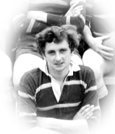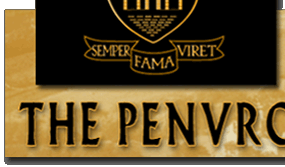History of PGS....cont'd |
The 1944 Education Act was a revolutionary piece of legislation that finally brought free secondary education to all members of society, regardless of their social standing and wealth. A tripartite system created a series of Grammar, Technical and Secondary Modern Schools that were meant to provide the style and type of education most suitable for each individual child. It was, in theory at least, a highly enlightened system. The fact that it never really worked – most parents immediately decided that the only school worth having was the Grammar School and duly had their children coached for the dreaded “Eleven plus” exam – should not take away from the aim: free and appropriate education for all.
|
|
Dinner Time! |
Pembroke County School became Pembroke Dock Grammar School in the immediate post-war years, although the name “County School” stuck with the establishment almost until the end. The appointment of the Welsh poet and writer Roland Mathias to the post of Head teacher brought something of a revival in the school’s fortunes. He re-established the house system and, with the appointment young and enthusiastic fellow-poet Raymond Garlick in April 1949, brought enlightened arts education – particularly in the field of English literature - to his pupils. (However, Garlick, the first appointment made by Roland Mathias, has maintained that, if Mathias been able to persuade the poet Glyn Jones to leave his teaching post in Cardiff, he would never have been invited to teach English at Pembroke Dock at all.) The founding of the Dock Leaves Group – a band of university graduates who wanted to study literature – led directly to the creation of the magazines Dock Leaves and, eventually, the Anglo-Welsh Review, edited by both Mathias and Garlick. |
|
Bush House - formerly the home of the Meyricks |
By the early years of the 1950s, it was clear that the school in Pembroke Dock was neither big enough nor equipped for modern education. Land on the old Meyrick Estate at Bush, between Pembroke and Pembroke Dock, was given over and a brand new school, now called Pembroke Grammar School, built on the side of the hill. |
|
|
The new Pembroke Grammar School as seen from the air.
Original photo courtesy of the then Officer Commanding-RAF Pembroke Dock |
The move to the new school was made in 1955 - the old buildings that had been in use since the old Intermediate School days being taken over as the Upper School of the town’s Secondary Modern, the Coronation.
Almost from the beginning, there were problems with the new Grammar School buildings: problems of slippage. Very real fears were expressed that the modern building was sliding slowly down hill towards nearby Pembroke River. Pieces of glass were inserted into several of the walls to ascertain the extent of the slippage, whole generations of pupils insisting that the pieces of glass were the only things stopping the whole complex sliding into the water.
Roland Mathias left the school, being replaced by TC Roberts - a mathematician this time, rather than a poet. The house system continued, with scores of pupils competing against each other in rugby and hockey on the sports field, in drama and public speaking on the stage, and in singing and poetry recitation in the annual eisteddfod.
One unique feature of the school was the creation of the boarding facility at Bush House. Formerly the home of the Meyricks, this Victorian mansion was converted and run as a boarding establishment for those youngsters, many of them from farming families as far away as Kent and the Home Counties, who wished to pursue a Grammar School education but, at the same time, study agriculture and farming. There was a huge market garden and a fully stocked farm for them to practise their chosen profession, whilst learning the theory of things like animal husbandry – the school even offered an “O” Level in Farm Biology! |
|
The 1944 Education Act, it can be argued, was an essentially conservative piece of legislation. It preserved the status quo in many respects, creating a system of privilege on the one hand and a stigma of failure on the other. However, with the advent of successive Labour administrations in the 1960s the day of the Grammar and Secondary Modern Schools was over. Comprehensive education was the thing of the future and Pembroke School had no divine right to preservation. After much debate and prevarication the two schools of the area – Pembroke Grammar School and the Coronation – were merged into Pembroke Comprehensive in the summer of 1972.
Phil Carradice |
|
 |
|
Past pupil, Phil Carradice, was educated at Cardiff College of Education and Cardiff University, and became a teacher and social worker. While teaching at Milford Central School, he was Housemaster at Bush House from 1970 - 1972. After several years as head of Headlands Special School in Cardiff, he retired from teaching to become a full-time writer. He hosts a history series on BBC Radio Wales entitled The Past Master. CLICK HERE
Phil's many books are available on Amazon CLICK HERE
|
|

|
Click on the BBC logo left and keep up with Phil's uniquely Welsh perspective on major world history events as well as some lesser known, which include Pembroke & Pembroke Dock. |
|
|
© 2009-2011 ThePenvro.com - General Copyright Notice: Unless indicated to the contrary, all materials on this site including design, text, graphics, photographs and images are the copyright of ThePenvro.com and are not available for commercial use. All other images and/or photographs appearing on this site are the property of their respective owners, as indicated.
Where copyright for photographs on this site is known, it is indicated. There are other examples where attempts to locate the copyright holders have failed. Wherever the original photographer or company is known they are attributed. However, in some cases, there is no indication of who took the original photo or where the copyright, if any, may reside. If anyone viewing the site can provide such information, the wishes of the copyright holder will be respected. Please contact:info@thepenvro.com
|













